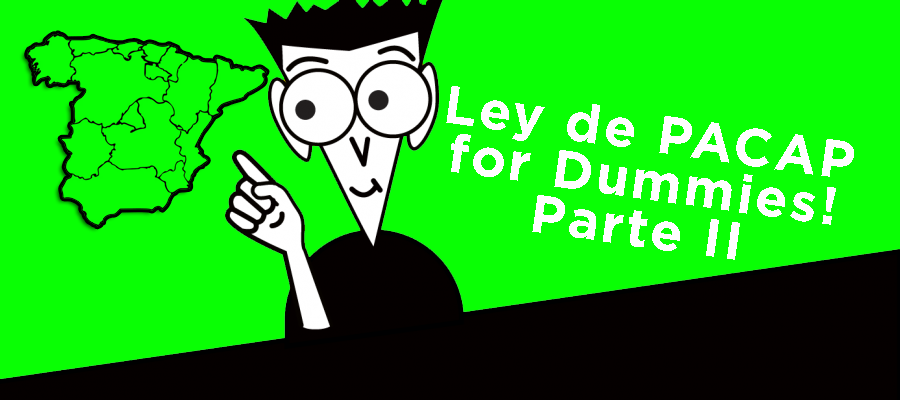Understanding the PACAP Law. Part II: Executive Power
After having a clearer understanding of what laws are, we will continue reviewing things we thought we already knew but didn't fully comprehend so that when we start analyzing Law 39/2015, it will be easy for us.
In this section, we will understand and break down the structure of the Spanish state to know the competencies of each organization and how it is organized.
We previously discussed that the state has three powers: legislative, executive, and judicial. Since we analyzed the legislative power in the previous section, we will now talk about the executive power. Remember that the executive power is the one that applies the laws.
The executive power
The political form of the Spanish State is parliamentary monarchy. Article 97 of the Constitution states that:
The Government directs the domestic and foreign policy, the civil and military administration, and the defense of the State. It exercises the executive power established by law in accordance with the Constitution and the law.
The General Administration of the State (hereafter referred to as AGE) is a public organization with jurisdiction over the entire national territory. This is the root or parent public administration, and the government uses it as the main tool to implement laws. There are other types of administrations with different territorial capacities, meaning that their scope of action applies to certain regions. We also have Autonomous Communities Administrations that only have jurisdiction in the autonomous communities, and Local Administrations that only have jurisdiction at the municipal level.
Let's delve deeper:
Autonomous Community: The RAE definition clarifies everything: In Spain, a territorial entity that, within the constitutional order of the State, is endowed with legislative power and executive competences, as well as the faculty to govern itself through its own representatives.
Municipal: pertaining to the municipality. A municipality is a population, a city, etc. According to the RAE, it is a Local entity formed by the residents of a certain territory to autonomously manage their common interests, but it is useful to know the original meaning used by the Romans to better understand it: Among the Romans, principal and free city, which governed itself by its own laws and whose inhabitants could obtain the privileges and rights of the citizens of Rome.
As stated in Law 40/2015 on the Legal Regime of the Public Sector in its article 55 (https://www.boe.es/buscar/act.php?id=BOE-A-2015-10566&p=20151002&tn=1#a55), the AGE is composed of:
- The Central Organization, which is divided into:
- Superior Bodies (Ministers and State Secretaries)
- Management Bodies (Undersecretaries and General Secretaries; Technical General Secretaries and General Directors; and Deputy General Directors).
- The Territorial Organization (Government Delegations in the Autonomous Communities, Government Sub-delegations in the Provinces, which will have the rank of Deputy Director General).
- The State Administration Abroad (embassies and consulates).
1. Central Organization
The Government of Spain is the constitutional body that heads the state executive power and directs the General Administration of the State. The Government is chaired by a prime minister, or president of the government. They are elected in parliament by a majority and appointed by the king. The head of government suggests the ministers, and the king is also responsible for appointing them. Appointed positions are dismissed by the king. The king cannot reject the proposals of the head of government.
Parliament can exercise control over the Government through a vote of no confidence (Articles 113 and 114 of the Constitution).
The head of Government has the power to dissolve the legislative chambers, although not during the process of a vote of no confidence against the Cabinet they preside over. Dissolving the legislative chambers would imply a new call for elections.
The Government must leave office after a general election, or if there is a loss of parliamentary confidence, as provided by the Constitution, or in the event of the resignation or death of the head of Government.
Government members meet in the Council of Ministers and in Government Delegated Committees. There are collaborative bodies such as the State Secretaries, the General Commission of State Secretaries and Undersecretaries, the Government Secretariat, and the Cabinets.
The Council of Ministers is the plenary collegiate body of the Government. It brings together all Government members (President, Ministers, and, if they exist, Vice Presidents and Ministers without Portfolio), and State Secretaries may be summoned. The Council of Ministers is usually identified with the Government itself. In Spain, there are 18 ministries with their 18 ministers:
- Presidency of the Government
- Agriculture, Fisheries and Food
- Foreign Affairs, European Union and Cooperation
- Science, Innovation and Universities
- Culture and Sports
- Defense
- Economy and Business
- Education and Vocational Training
- Development
- Treasury
- Industry
- Justice
- Presidency, Relations with the Courts and Equality
- Territorial Policy and Civil Service
- Health, Consumption and Social Welfare
- Labor, Migrations and Social Security
- Interior
- Ecological Transition
The Government Delegated Committees are reduced collegiate bodies, created and abolished by Royal Decree of the Council of Ministers, at the proposal of the President of the Government. The presidency of each Delegated Committee falls to the President of the Government or to their Vice Presidents. Exceptionally, a sectoral High Official has been included as a member of a Government Delegated Committee.
The State Secretariat is a unipersonal senior management body, subject to the direction of a Minister or the President of the Government. It is a superior intermediate position and is between the ministry and the civil service. The State Secretaries and the Undersecretaries form a commission responsible for preparing and studying the issues to be discussed at the Council of Ministers.
The Government Secretariat, which is organically integrated into the Ministry of the Presidency, is responsible for providing technical and administrative support to the Council of Ministers, the Government Delegated Committees, and the General Commission of State Secretaries and Undersecretaries.
The Cabinets are advisory bodies with a marked political character that assist the President of the Government, the Vice Presidents, the Ministers, and the State Secretaries. Cabinets perform tasks of trust and special advice.
Public bodies attached to the Ministries: public bodies, public business entities, agencies, public foundations, and public companies. For example, the State Employment Service.
Institutions regulated by special regulations: For example, the Bank of Spain, State Tax Administration Agency.
2. Territorial or Peripheral Organization
Delegations
Government Sub-delegations
Island Directorates (for the Balearic and Canary Islands)
Bodies and institutions directly dependent on the ministries.
3. General State Administration Abroad
Delegations.
Public institutions and bodies of the General State Administration, whose actions take place abroad.
Diplomatic Missions, Permanent or Special.
Consular Offices.
Permanent or Special Representations or Missions.




